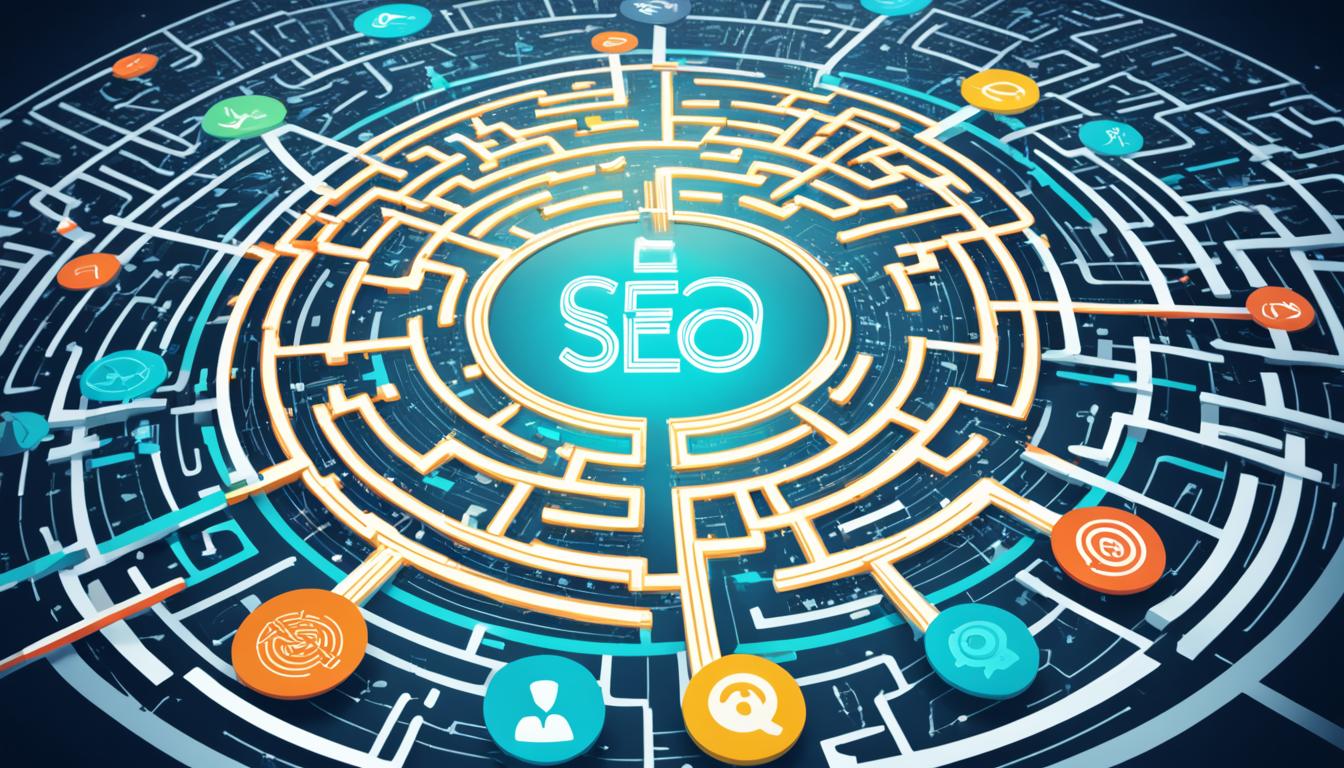Did you know that mastering self-taught advanced SEO strategies can significantly impact your online presence? With advanced search engine optimization techniques, you can skyrocket your website’s visibility, drive organic traffic, and boost your search engine rankings.
Whether you are a business owner, marketer, or blogger, honing your self-taught SEO skills can make all the difference in achieving SEO mastery and staying ahead of the competition. By implementing self-taught SEO best practices, you can unlock the true potential of your website and reach new heights in the digital landscape.
Key Takeaways:
- Mastering self-taught advanced SEO strategies can significantly impact your online presence.
- Advanced search engine optimization techniques can skyrocket your website’s visibility and search engine rankings.
- Honing your self-taught SEO skills is essential for achieving SEO mastery and staying ahead of the competition.
- Implementing self-taught SEO best practices can help you unlock the true potential of your website.
- By staying committed to continuous learning and refining your SEO tactics, you can achieve long-term success in organic search optimization.
Understanding SEO Basics
In the digital age, search engine optimization (SEO) is a crucial practice for any website owner. By understanding the basics of SEO, you can optimize your website and attract organic traffic, ultimately driving more visitors to your site. In this section, we’ll explore the fundamentals of SEO, including how it works and the key ranking factors that influence your website’s visibility in search engine results.
What is SEO?
SEO, or search engine optimization, refers to the process of improving your website’s visibility in search engine results. When a user searches for something on a search engine like Google, the search engine algorithm determines which websites are most relevant to that search and displays them in the search results. By optimizing your website, you can increase your chances of appearing higher in the rankings and attracting more organic traffic.
SEO is like a road map that guides search engines, helping them understand what your website is about and how it relates to user queries.
Driving Organic Traffic
One of the primary goals of SEO is to drive organic traffic to your website. Organic traffic refers to website visits that come from unpaid search results, as opposed to paid advertising. When your website appears higher in search engine rankings, it becomes more visible to users who are actively searching for relevant information or products. This increased visibility can lead to more clicks, visits, and potential conversions for your business.
SEO Ranking Factors
Search engines use complex algorithms to determine how to rank websites in search results. While these algorithms take into account various factors, there are a few key SEO ranking factors that play a significant role:
- Relevance: The search engine assesses how relevant your website is to the user’s query.
- Content Quality: High-quality, informative, and original content is valued by search engines.
- Keyword Optimization: Optimizing your website’s content with relevant keywords helps search engines understand your site’s topic.
- User Experience: A user-friendly website that loads quickly and offers a seamless experience helps improve rankings.
- Backlinks: High-quality backlinks from reputable websites indicate that others find your content valuable.
By understanding and leveraging these SEO ranking factors, you can strategically optimize your website to improve its visibility and attract more organic traffic.
Now that you have a solid understanding of SEO basics, let’s dive deeper into building essential SEO skills and uncover advanced strategies that can help you excel in the world of search engine optimization.
Building Essential SEO Skills
To excel in self-taught advanced SEO strategies, it’s important to develop essential skills. These skills include:
- Keyword Research: Conducting thorough keyword research to identify relevant search terms that align with your target audience’s search intent.
- SERP Analysis: Analyzing search engine results pages (SERPs) to understand the competition and identify opportunities to improve your website’s visibility.
- Content Creation: Crafting high-quality and optimized content that engages users and aligns with SEO best practices.
- On-Page Optimization: Optimizing on-page elements such as meta tags, headings, and URL structure to improve search engine rankings.
- Technical SEO: Implementing technical SEO practices like improving website speed, enhancing crawlability, and fixing technical issues.
- Link Building: Building high-quality backlinks from authoritative websites to increase your website’s authority and improve its rankings.
- Website Architecture: Organizing your website’s structure and navigation to enhance user experience and make it easier for search engines to crawl and index your pages.
- SEO Performance Monitoring: Tracking key SEO metrics, analyzing data, and making data-driven decisions to continuously optimize your SEO strategies.
By honing these essential SEO skills, you’ll be equipped to create a solid foundation for implementing advanced self-taught SEO strategies that can drive organic traffic and improve your website’s search engine visibility.
Example:
When you conduct thorough keyword research, you gain valuable insights into the search terms your target audience uses. This knowledge helps you create content that meets their needs and increases your chances of ranking higher in search engine results. Additionally, by performing SERP analysis, you can understand the strengths and weaknesses of your competitors, identify content gaps, and uncover opportunities to stand out in the search results.

Learning SEO Fundamentals
Before diving into mastering advanced SEO strategies, it’s crucial to acquire a solid understanding of SEO fundamentals. Familiarizing yourself with the basics will provide a strong foundation for your SEO journey. A valuable resource to kickstart your learning is Google’s SEO starter guide. This comprehensive guide offers an in-depth overview of search engine optimization and covers key topics such as search engine algorithms, ranking factors, and best practices.
As you embark on your SEO education, it’s essential to grasp key SEO terminology. This will help you navigate the SEO landscape with confidence. Take the time to understand terms like on-page SEO and off-page SEO, which encompass different optimization strategies for your website and beyond.

Gaining insights into search engine algorithms is also essential. Search engines use complex algorithms to determine the ranking of websites in search results. Understanding these algorithms will enable you to tailor your SEO efforts accordingly and stay ahead of the competition.
To optimize your website effectively, you must comprehend on-page SEO techniques. This includes optimizing your website’s content, meta tags, URL structure, and internal links to enhance its visibility to search engines and improve user experience.
Additionally, off-page SEO strategies play a crucial role in boosting your website’s visibility and authority. These strategies involve building high-quality backlinks, engaging in guest blogging, and leveraging social media platforms to establish your website’s credibility and reputation among search engines.
By investing time in learning the basics of SEO, you’ll pave the way for mastering advanced SEO strategies. Stay curious, explore different resources, and apply your knowledge to drive organic traffic and achieve your SEO goals.
Continuing Education and Staying Updated
In the dynamic field of SEO, staying on top of trends and continuously learning is crucial to success. With industry updates and algorithm changes happening frequently, you need to stay informed to adapt your strategies accordingly. Continuous learning and staying updated with SEO resources will help you maintain a competitive edge and drive optimal results for your website.
“The only way to win at SEO is to play the game, adapt, and continuously educate yourself.” – Neil Patel
To stay ahead of the curve, here are some effective strategies for continuous learning and staying updated in the SEO industry:
- Regularly read reliable SEO resources: There are several authoritative SEO resources available that provide valuable insights and updates. Stay engaged with industry blogs, reputable websites, and forums to gain new knowledge and stay updated with the latest trends and best practices.
- Engage in online courses: Enroll in online SEO courses or webinars to deepen your knowledge and learn from industry experts. These courses can provide you with practical tips, advanced strategies, and hands-on experience to enhance your SEO skills.
- Study your competitors: Analyzing your competitors’ SEO strategies and tactics can give you insights into their success. Monitor their website rankings, backlink profiles, content strategies, and social media activities. By studying their approach, you can identify potential gaps or opportunities for improvement in your own SEO strategy.
- Leverage SEO tools: Utilize SEO tools to stay updated on industry changes, analyze keyword trends, track website performance, and improve overall SEO strategy. These tools can provide valuable data and insights that help you make informed decisions and stay ahead of the competition.
By investing time and effort into continuous learning and staying updated, you can ensure that your SEO strategies remain effective and aligned with the ever-changing landscape of search engine optimization.
Stay Ahead with Continuous Learning
Continuous learning is an essential aspect of staying ahead in the SEO industry. It allows you to keep up with the latest trends, algorithm changes, and best practices. By expanding your knowledge and skillset, you can optimize your website’s performance and drive organic traffic effectively.
Start earning effortlessly! Claim your $3 bonus and monetize your unused data with Honeygain. It’s simple, secure, and smart.
Claim Nowand watch your balance grow! 🍯💸
Here are some additional resources for continuous learning and staying updated in the SEO field:
| Resource | Description |
|---|---|
| Moz | A leading SEO software provider that offers a wealth of educational resources, including blog posts, webinars, and courses. |
| Search Engine Journal | An authoritative source for SEO news, industry updates, and best practices through articles, guides, and expert insights. |
| SEMrush Academy | Offers a wide range of SEO courses, certification programs, and webinars to help you enhance your SEO skills and knowledge. |
| Search Engine Guide | A comprehensive resource for SEO articles, tips, and tutorials to improve your understanding of search engine optimization. |
Continuously educating yourself and staying updated with industry trends will equip you with the knowledge and skills to adapt to algorithm changes, optimize your website, and achieve long-term SEO success.
The Importance of Content in SEO
Content is a crucial component when it comes to achieving SEO success. By creating high-quality and optimized content, you can greatly improve your chances of ranking higher in search engine results. Let’s explore the key factors that make content optimization so vital in the world of SEO.
One of the essential considerations when optimizing your content is to align it with the search intent of your target audience. Understanding what users are looking for and tailoring your content to meet their needs will greatly improve your chances of attracting organic traffic. By providing valuable and relevant information, you can establish yourself as a trusted source within your industry.
Building credibility is essential in the world of digital marketing, and that’s where factors like expertise, authority, and trustworthiness (E-A-T) come into play. By showcasing your expertise through well-researched and insightful content, you can build authority and gain the trust of your audience and search engines alike. This, in turn, can have a positive impact on your search engine rankings.
While optimizing your content, it’s imperative to prioritize user experience. Engaging, informative, and well-organized content not only keeps users on your page longer but also encourages them to explore further. By providing a seamless user experience, you are more likely to earn repeat visits and increase engagement metrics, which can positively influence your SEO performance.
Remember, to achieve SEO success, it’s essential to focus on delivering high-quality content that is optimized for both search engines and users. By considering search intent, building credibility through E-A-T, and prioritizing user experience, you can create content that not only ranks well but also engages and converts your target audience.
Implementing Off-Page SEO Strategies
Off-page SEO plays a crucial role in improving your website’s search engine rankings. While on-page optimization focuses on optimizing your website’s content and structure, off-page SEO involves external actions to enhance your website’s authority and credibility. A key component of off-page SEO is link building, which involves acquiring high-quality backlinks from reputable websites.
Link building is a process of acquiring external links that point back to your website. These backlinks act as signals of quality and trust to search engines, indicating that your website is valuable and authoritative. By acquiring relevant and authoritative backlinks, you can boost your website’s authority and improve its ranking in search engine results.
Backlink Acquisition
Acquiring backlinks is a crucial part of off-page optimization. To successfully acquire backlinks:
- Identify authoritative websites in your niche or industry.
- Reach out to website owners or content creators and propose relevant content collaborations or guest blogging opportunities.
- Create high-quality guest blog posts that provide valuable insights or information for the target website’s audience.
- Include a link back to your website within the guest blog post.
Guest Blogging
Guest blogging is a popular and effective off-page SEO strategy. By contributing valuable content to other websites in your industry, you can showcase your expertise, build relationships with influencers, and acquire authoritative backlinks. When guest blogging:
- Identify reputable websites that accept guest blog posts.
- Ensure your guest blog posts are relevant to the target website’s audience and provide valuable information or insights.
- Include a link back to your website within the author bio or the body of the guest blog post.
Off-Page Optimization
Off-page optimization encompasses various strategies to improve your website’s visibility and authority. In addition to link building and guest blogging, other off-page optimization techniques include:
- Active social media engagement to promote your website’s content and attract attention from potential backlink sources.
- Building relationships with influencers or industry experts who can endorse or share your content, increasing its visibility and reach.
- Participating in relevant online communities, forums, or industry-specific platforms to establish your expertise and credibility.
Implementing off-page SEO strategies is essential for improving your website’s authority and ranking in search engine results. By focusing on link building, backlink acquisition, guest blogging, and other off-page optimization techniques, you can enhance your website’s visibility and attract organic traffic from search engines.
Enhancing Technical SEO
When it comes to optimizing your website for search engines, technical SEO plays a crucial role. By focusing on various technical aspects, you can enhance crawlability, indexability, and overall website performance. In this section, we’ll discuss the key elements of technical SEO that you should pay attention to.
Website Performance
Website performance is a critical factor in determining search engine rankings. A slow-loading website can negatively impact user experience and result in higher bounce rates. To improve website performance, optimize your page load speed by minimizing image sizes, reducing server response time, and leveraging browser caching. By ensuring a fast and seamless browsing experience, you can increase user engagement and improve your search engine visibility.
Site Structure and XML Sitemap
A well-organized site structure improves both user experience and crawlability. Ensure that your website is logically structured with clear navigation and hierarchical page organization. Implementing an XML sitemap provides search engines with a roadmap of your website’s pages, making it easier for them to discover and index your content effectively. Regularly update and submit your XML sitemap to keep search engines informed about changes to your website.
Robots.txt and Crawlability
The robots.txt file is a powerful tool that allows you to control how search engines crawl and index your website. Properly configuring your robots.txt file ensures that search engine bots can easily access and navigate your site, while also preventing them from crawling sensitive or irrelevant pages. Use the robots.txt file to disallow access to certain directories or specific files that you don’t want to be indexed.
Structured Data and Indexability
Implementing structured data on your website helps search engines understand your content better. By marking up your pages with schema markup, you provide additional context and information about your content, resulting in enhanced search engine visibility and improved indexability. Structured data can also help your website to appear in rich snippets and various other search engine features.
Page Speed
Page speed is not only crucial for user experience but also a ranking factor in search engine algorithms. Optimize your website’s performance by compressing files, minifying CSS and JavaScript, and leveraging browser caching. Regularly monitor and analyze your page speed using tools like Google PageSpeed Insights to identify areas for improvement and ensure optimal loading times.
By paying attention to these technical SEO aspects, you can ensure that your website is easily discoverable, accessible, and optimized for search engines. Improving website performance, optimizing site structure, utilizing XML sitemaps, configuring robots.txt files, implementing structured data, and prioritizing page speed are all key steps towards maximizing your website’s visibility and organic search success.
Conclusion
Congratulations on taking the first steps towards mastering self-taught advanced SEO strategies! Becoming an SEO expert requires continuous learning and staying updated with the latest industry trends and algorithm changes. By building essential SEO skills, understanding the fundamentals, optimizing your content, implementing off-page and technical SEO strategies, and monitoring your performance, you are on the path to achieving SEO mastery and driving success.
Remember, dedication is key. Keep investing in your self-education, explore new SEO resources, and adapt your strategies as search engines evolve. By staying committed to continuous learning, you can refine your SEO tactics and achieve long-term success in organic search optimization.
As you continue to enhance your SEO knowledge, always prioritize user experience and create high-quality, optimized content that aligns with search intent. Building credibility and authority through expertise, authoritativeness, and trustworthiness will further boost your website’s visibility in search engine results.
In this fast-paced field, SEO mastery is an ongoing journey. So stay curious, stay hungry, and keep adapting. With your dedication and these advanced SEO strategies, you have the potential to elevate your digital presence and achieve tremendous success in the world of organic search optimization.

